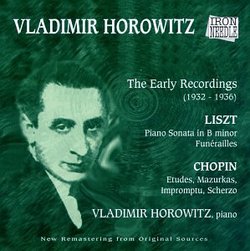| All Artists: Vladimir Horowitz Title: The Early Recordings (1932-1936) Members Wishing: 0 Total Copies: 0 Label: Iron Needle Records Original Release Date: 1/1/1932 Re-Release Date: 11/7/1995 Album Type: Original recording remastered Genre: Classical Styles: Chamber Music, Forms & Genres, Short Forms, Sonatas, Historical Periods, Classical (c.1770-1830), Modern, 20th, & 21st Century, Romantic (c.1820-1910), Instruments, Keyboard Number of Discs: 1 SwapaCD Credits: 1 UPCs: 723723792525, 789368207725, 8011662904638 |
Search - Vladimir Horowitz :: The Early Recordings (1932-1936)
 | Vladimir Horowitz The Early Recordings (1932-1936) Genre: Classical
|
Larger Image |
CD Details |
CD ReviewsImportant recordings of the great Horowitz in his early 30s Craig Matteson | Ann Arbor, MI | 12/23/2005 (5 out of 5 stars) "While Horowitz was acclaimed as one of the greatest piano virtuosos throughout his life, it is as a young man he burst into the musical firmament like a supernova. His miraculous touch, speed, clarity, and seemingly limitless capacity were all on display from the beginning. Here we have some of those early recordings made in London between 1932 and 1936 (originally on 78 rpm disks). Horowitz was between 29 and 35 years old when these recordings were made.
The disk opens with two monumental pieces by the greatest piano virtuoso, Franz Liszt; the monumental Sonata in b-minor and the very demanding "Funérailles" (written to honor Hungarian patriots). They both require the ability to hold together large dramatic structures with the ability to provide unity and contrast. The b-minor sonata is a pianists dream, but extremely difficult. It can become a bit of a chestnut in the hands of someone less than great musical gifts, intelligent artistry, and monumental technique. The patriotic work requires the ability to hold drama at a slow tempo even though there is a heroic Chopin-Polonaise-like section towards the end. Horowitz shows himself to be a hero of the keyboard. Lightening technique, huge range of tone colors, gossamer tone in the pianissimo runs, and more. The Chopin works on this disk are also quite wonderful. The etudes also show a range of drama, technique, and poetry. However, I think the most brilliant display is the Mazurka Op 7 no. 3. The range of tone in the runs is magical while still holding the dance rhythm in time, but appropriately flexible. The Scherzo number 4 is a display of virtuosity without measure. This is an historically important disk and I am glad to have it. You would be happy to heart it as well." |

 Track Listings (12) - Disc #1
Track Listings (12) - Disc #1